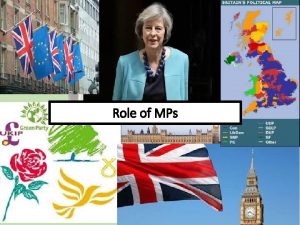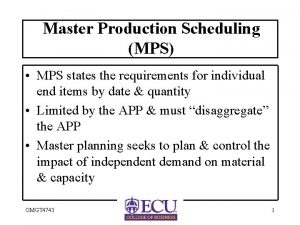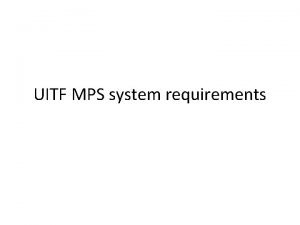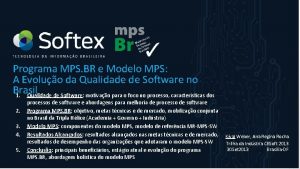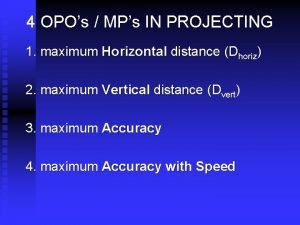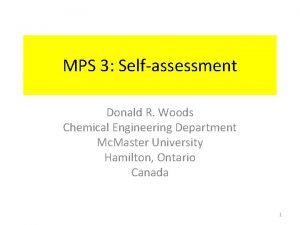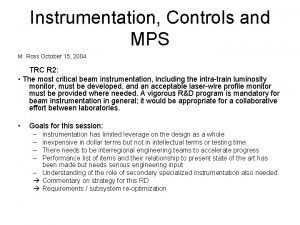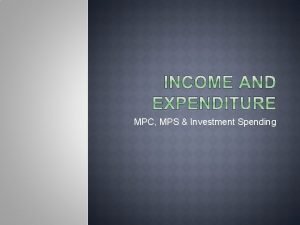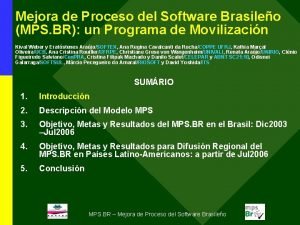Role of MPs The Role of MPs It



















- Slides: 19

Role of MPs

The Role of MPs “It is the highest and most legitimate pride of an Englishman to have the letters of MP written after his name. ” - Anthony Trollope, 1865

The Role of MPs • The UK public elects Members of Parliament (MPs) to represent their interests and concerns in the House of Commons. • MPs are involved in considering and proposing new laws, and can use their position to ask government ministers questions about current issues. • MPs split their time between working in Parliament itself, working in the constituency that elected them and working for their political party. • Some MPs from the governing party (or parties) become government ministers with specific responsibilities in certain areas, such as Health or Defence. Representing their constituents Serving constituents Voting on legislation Debates Committee work Private members’ bills Executive scrutiny

The Role of MPs Working in Parliament Working in their constituency • When Parliament is sitting • In their constituency, MPs (meeting), MPs generally often hold a 'surgery' in spend their time working in their office, where local the House of Commons. people can come along to • This can include raising issues discuss any matters that concern them. affecting their constituents, attending debates and voting • MPs also attend functions, on new laws. visit schools and businesses and generally try to meet as • Most MPs are also members many people as possible. of committees, which look at issues in detail, from • This gives MPs further government policy and new insight and context into laws, to wider topics like issues they may discuss human rights. when they return to Westminster.

Representing their constituents • MPs are expected to raise issues of particular concern for the people who live in their constituencies, whether they voted for the MP’s party or not. • EG: If a local factory closes, the MP is expected to raise the matter with a relevant minister, even if nothing can be done about it. EXAMPLE Mark Lancaster MP (Milton Keynes South) writes to Chief Executive about local surgery closure (6. 6. 13) http: //www. mkweb. co. uk /News/Health/MP-Mark. Lancaster-writes-to-NHSEngland-over-Willen. Surgery-closure 20130606132813. htm

Serving constituents • Apart from their work at Westminster, MPs make regular visits to their constituencies, where they can be approached by the residents for advice and, where possible, practical help.

Voting on legislation • Every MP is entitled to cast a vote on a bill. EXAMPLE The full list of MPs voting for or against the government's same-sex marriage legislation. http: //www. bbc. co. uk/ne ws/uk-politics-21346694

Debates • Backbench MPs can speak in the most important debate on any bill – the second reading. • But they do not have an equal right to speak. • The speaker who presides over debates, normally gives preference to exministers, especially on important issues. • But in most cases an MP will enjoy the right to be heard if he or she wishes to say anything. EXAMPLE Ed Balls resorts to name calling in Spending Review Debate – Zippy, Bungle and the Muppets (26. 06. 13) http: //www. express. co. uk/n ews/uk/410484/Zippy. Cameron-and-Bungle. Osborne-taken-to-task-by. Ed-New-Balls-in-Commons

Debates • MPs enjoy parliamentary privilege; that is, they cannot be sued for anything mentioned during a speech within the confines of Westminster. • They can also initiate adjournment debates, which give them a chance to win publicity for their views on subjects important to them. • They can put down early day motions for the same purpose, giving their views in writing in the hope that enough MPs will offer supporting signatures to win publicity for the cause. • Early day motions are never debated, but they can serve to make a point provided that sufficient signatures can be obtained.

Committee work • MPs with an enthusiasm for a particular subject can be chosen to serve on a standing committee, which deals with legislation in a specific area, or a select committee, which keeps an eye on the work of a department, or several departments. EXAMPLE The prestigious Public Accounts Committee, which was founded as long ago as 1862, oversees spending across Whitehall. http: //www. parliament. uk /pac

Private members’ bills • Although backbench MPs cannot hope to pass their own ideas into legislation EXAMPLE without government support, if they are successful in a ballot they can introduce a bill. • Again, the goal here is usually to win publicity for a favourite cause (or to impress constituents) because in most circumstances the bill fails through lack of time.

Private members’ bills • But sometimes a private member’s bill will be given either open or tacit support by the government and eventually reach the statute book. • Some important social legislation of the 1960 s, including the Abortion Act, originate in this way. • It is a convenient way for governments to allow the passage of controversial legislation without being blamed by its opponents for having introduced the bill in the first place. EXAMPLE

Executive scrutiny • Conscientious backbenchers of all parties can dredge useful (and sometimes embarrassing) information out of the government. • Apart from the regular Question Times, MPs can submit questions in writing and the relevant ministers answer is published in the Hansard – the official record of parliamentary debates. EXAMPLE http: //www. parliament. uk/ business/news/2013/june/p rime-ministers-questions-19 -june-2013 -/

Spotlight on… MPs Expenses Scandal • FOI request for MPs Expenses 2005 (rejected – Information Commissioner rules parliament has to comply) • Details of 6 MPs Expenses published in Jan 2008, 14 in March 2008, mass documentation in May 2008 • 2009 – discussion of MP expenses reforms – Parliamentary Standards Bill becomes law 21. 07. 09 • Criminal investigations and prosecutions of some MPs




“What about my third home? ”

And finally… • Annotate your MP with each role they perform, with a brief explanation.
 What is the role of mps
What is the role of mps ưu thế lai là gì
ưu thế lai là gì Môn thể thao bắt đầu bằng từ chạy
Môn thể thao bắt đầu bằng từ chạy Tư thế ngồi viết
Tư thế ngồi viết Thẻ vin
Thẻ vin Hình ảnh bộ gõ cơ thể búng tay
Hình ảnh bộ gõ cơ thể búng tay Cái miệng xinh xinh thế chỉ nói điều hay thôi
Cái miệng xinh xinh thế chỉ nói điều hay thôi Từ ngữ thể hiện lòng nhân hậu
Từ ngữ thể hiện lòng nhân hậu Trời xanh đây là của chúng ta thể thơ
Trời xanh đây là của chúng ta thể thơ Tư thế ngồi viết
Tư thế ngồi viết Ví dụ về giọng cùng tên
Ví dụ về giọng cùng tên Voi kéo gỗ như thế nào
Voi kéo gỗ như thế nào Thể thơ truyền thống
Thể thơ truyền thống Hươu thường đẻ mỗi lứa mấy con
Hươu thường đẻ mỗi lứa mấy con Thế nào là hệ số cao nhất
Thế nào là hệ số cao nhất Diễn thế sinh thái là
Diễn thế sinh thái là đại từ thay thế
đại từ thay thế Vẽ hình chiếu vuông góc của vật thể sau
Vẽ hình chiếu vuông góc của vật thể sau Thế nào là mạng điện lắp đặt kiểu nổi
Thế nào là mạng điện lắp đặt kiểu nổi
